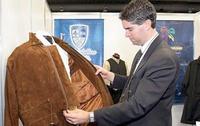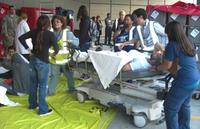-
Chips may sabotage hi-tech weapons
Countries producing sophisticated weapon systems do not want these systems to fall into the wrong hands; one idea is to plant a chip in these weapons which would allow the country that supplied them to destroy or disable them remotely; already there are worries that with chip manufacturing moving outside the United States, foreign powers may bribe or coerce chip manufacturers into planting “backdoor” circuits in chips these manufacturers sell American defense contractors
-
-
Mexico violence boon to security garment industry

The deteriorating security situation in Mexico is a boon to the security industry; the Ninth Expo-Seguridad in Mexico City saw many companies offering bullet-proof garments — vests, scarves, shirts, and underwear — that protect against attacks with sharp objects; also on display was the more traditional personal protection gear such as helmets, gloves, goggles, and bullet-proof vests able to stop rounds from AK-47 and AR-15 assault rifles; one star of the show was Colombian businessman Miguel Caballero who is known for the bullet-proof jackets and vests he has produced for politicians, businessmen, and former presidents from across Latin America
-
-
NY emergency services communication not up to snuff
Nearly ten years after the 9/11 attacks, many police officers and first responders in New York still carry radios that cannot communicate with fellow emergency services personnel working for other agencies and jurisdictions; often, they use their personal cell phones during an operation; state lawmakers want this situation changed
-
-
New cloth captures noxious gasses, odors
Cornell university students develop a new cloth that can capture noxious gasses and odors — and that can be fashioned into masks or hooded shirts to be used by soldiers and first responders; the garments use metal organic framework molecules (MOFs) and cellulose fibers
-
-
Disaster-zone phone communication software available for free
Australian researchers developed software which enables mobile phones to communicate during a disaster; it will be freely available to the public by the end of the year thanks to the support of the Dutch NLnet Foundation; the software can be used on compatible mobile phone handsets to create an alternative “network” where conventional mobile phone coverage has been destroyed or does not exist
-
-
U.S. Army surveillance blimp destroyed in accident
The U.S. military wants to place powerful sensors on blimps, and have these blimps loiter the sky above the battlefield; the sensors, produced by Raytheon, will enable battlefield commanders to increase their wide-area protection against land-attack cruise missiles; last September, two blimps moored next to each other in the Elizabeth City, North Carolina manufacturing facility, collided after one of them almost got loose; the cost to the Army: $168 million
-
-
U.S. to reconsider use of drones in Pakistan
In the last twenty-four months, U.S. drones have killed some 1,000 militants — but also about 600 civilians; in an effort to shore up fraying relationship with Pakistan, the U.S. ambassador to Pakistan said the United States would examine the continued use of drones in the war against the militants; Pakistani prime minister Asif Ali Zardari said the drone war has destabilized Pakistan and made political and economic reforms more difficult to accomplish
-
-
Rebels may sell missiles to finance campaign
In a congressional testimony, General Carter Ham, commander of the U.S. Africa Command, underscored the threat from shoulder-fired missiles looted from Libyan arms depots; Gen. Ham estimated that 20,000 of these missiles may have been in Libya at the time of the uprising; carried and fired by a single fighter, these missiles travel at supersonic speeds from a shoulder-fired launcher toward the heat signature of an aircraft engine, where they detonate
-
-
Report finds Coast Guard unprepared for BP oil spill
An internal review by the U.S. Coast Guard found that its response to the colossal Deep Water Horizon oil spill in the Gulf of Mexico last year was hindered by its lack of preparation and reduced response capabilities; the 158 page review said that the government and private sector “demonstrated a serious deficiency in planning and preparedness for an uncontrolled release of oil from an offshore drilling operation”; in response to the review, R. J. Rapp Jr., the commandant of the Coast guard, said that his agency would pay greater attention to industry oil-spill response plans, begin preparing for future accidents, and conduct a study on the large use of chemical dispersants on the environment
-
-
Hi-tech goggles to reduce number of friendly fire incidents

The modern battle-field is saturated with autonomous, remotely controlled platforms and weapons, and everything moves very fast; in addition, many of the engagements take place in close quarters; all these increase the risk of friendly fire; DARPA wants a small New York company to develop augmented reality goggles which will tell soldiers on the ground which air assets are nearby, bearing which weapons, thus resulting in more accurate destruction of enemy assets, less risk to friendly forces, and fewer civilian deaths
-
-
New method for lifting latent fingerprints
A team of researchers at Nanjing University of Technology has developed a new process for especially rapid and simple detection of fingerprints; all it takes is a special nanofiber mat that is pressed onto the suspect surface and briefly treated with hot air — the fingerprints appear as red ridge patterns
-
-
Anti-counterfeiting solution maker expands scientific teams
According to a 2011 report published by the International Chamber of Commerce (ICC), global counterfeiting losses are forecasted to grow to as high as $1.7 trillion by 2017; the economic impact of this on the U.S. economy alone is estimated to be $775 billion per year; there is thus a growing demand for anti-counterfeiting solutions, including SigNature® DNA from Applied DNA Sciences; the company is expanding its forensic scientific group
-
-
Local police wear vests at all times to receive Justice funds
The Justice Department has said that it will withhold federal funding for local police departments to purchase body armor unless they make it a requirement that all uniformed officers wear the armor; last year, the Justice Department distributed $37 million to reimburse more than 4,000 local agencies across the country for the purchase of nearly 200,000 vests; the new requirement comes after a sharp increase in the fatal shootings of police officers while on duty; there was a 44 percent increase in the number of fatal police shootings last year and a recent study showed that 41 percent of police departments do not require officers to wear body armor
-
-
DHS: U.S. unprepared for nuclear disaster

Confidential DHS report says the United States is ill-prepared for a nuclear disaster — either an accident or a terrorist attack; just one example: if a major nuclear bomb were to hit Washington, D.C., there would be a need for about 61,000 beds in intensive care units; there are, however, only 118,000 intensive care beds in the entire United States and, on any given day, only 9,400 are free.
-
-
Spate of dry-ice bombs explosions in Long Beach, Calif.
A Long Beach officer is injured after an investigation of a dry-ice bomb left in an alley; a dry ice bomb is a homemade device that uses water, a bottle and dry ice, or frozen carbon dioxide; it can take anywhere from thirty seconds to an hour for a dry-ice bomb to rupture, depending on temperatures outside of the bottle
-
More headlines
The long view
Why Ukraine’s AI Drones Aren’t a Breakthrough Yet
Machine vision, a form of AI, allows drones to identify and strike targets autonomously. The drones can’t be jammed, and they don’t need continuous monitoring by operators. Despite early hopes, the technology has not yet become a game-changing feature of Ukraine’s battlefield drones. But its time will come.
